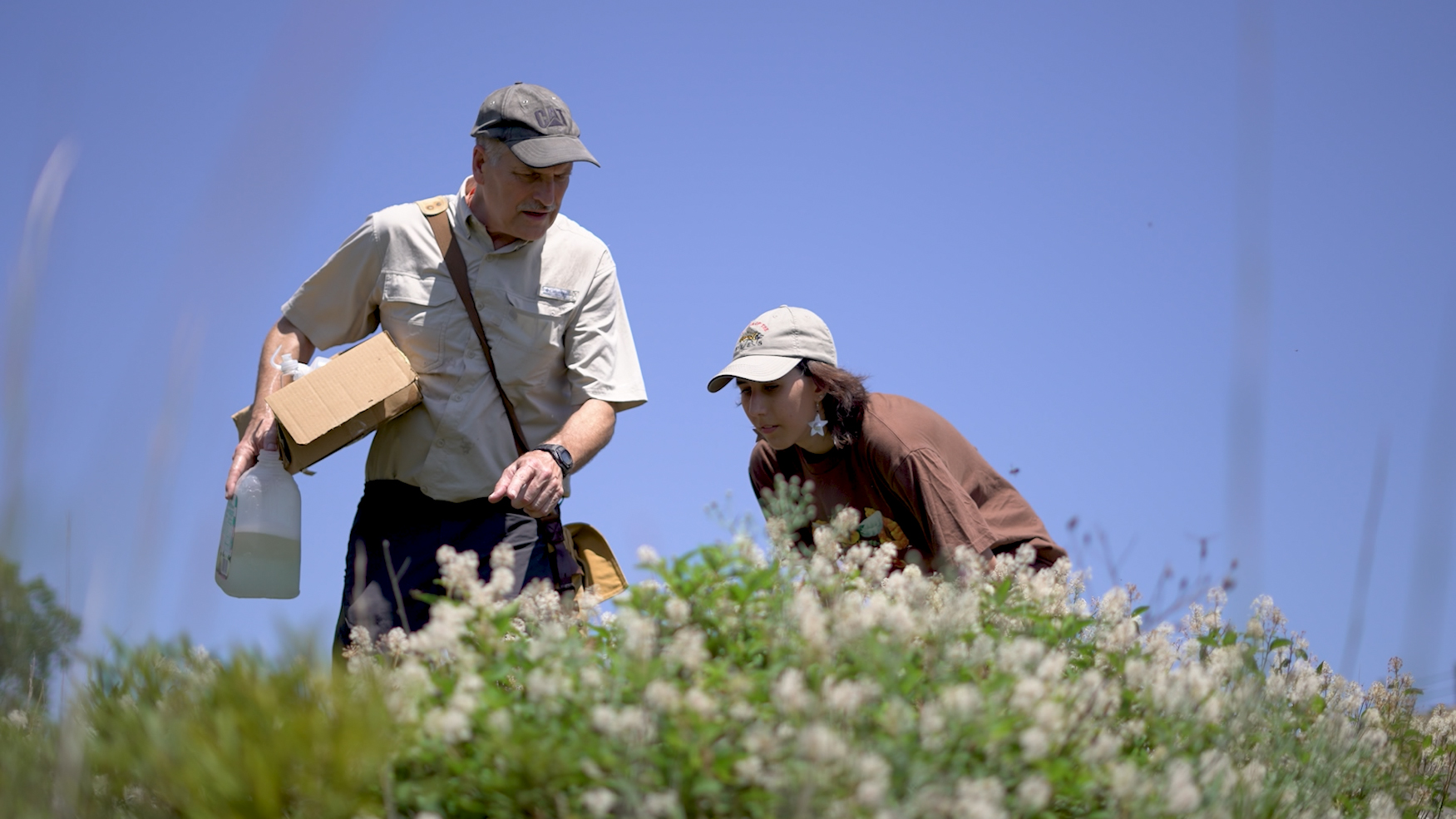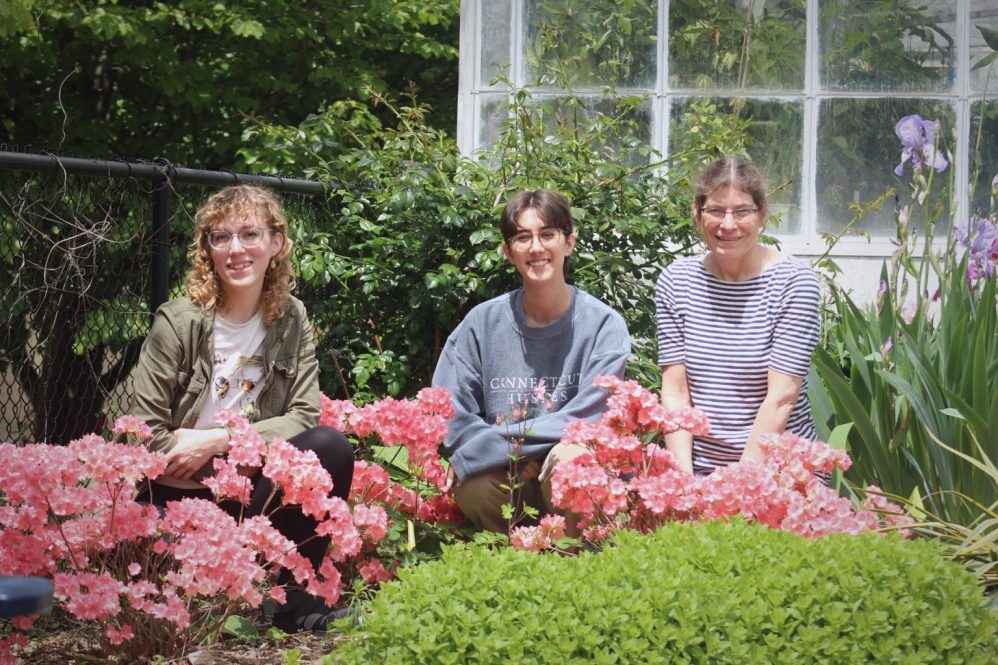Earlier this year, UConn inducted three graduate students into the National Science Foundation Graduate Research Fellowship Program (NSF GRFP). The NSF GRFP is a highly sought-after opportunity, providing financial support for graduate scientific study.
Besides their can-do attitudes and wicked smarts, the three students shared something in common: they were all participants in UConn’s Research and Mentoring for Postbaccalaureates in Biological Sciences (RaMP) program.
RaMP is a nationwide initiative funded by the NSF in 2022. UConn’s RaMP program centers on the theme of “Genomic Novelty” — investigating how and why genomes change over time. Its faculty mentors include professors from the Departments of Ecology & Evolutionary Biology; Physiology & Neurobiology; and Molecular & Cell Biology.
The program’s unique structure allows participants to pursue two major research milestones over the course of a full year: an independent project, advised by graduate student and faculty mentors, and an all-cohort group project which culminates in a summer publication.
In 2024, the UConn RaMP cohort published the world’s first complete genome sequence of the desert hairy scorpion. This year, they did the same for the Everglades mink, one of the rarest mammals in the United States.
Never Too Late: The Value of a Second Chance
Hands-on lab experience can be difficult to gain as an undergraduate, for various reasons. RaMP is designed to give college graduates another chance.
“I couldn’t do as much research in college because I had three jobs,” remembers Savanna Brown, a GRFP Fellow who just completed the second year of her Ph.D. in ecology and evolutionary biology at UConn.
She joined RaMP as a graduate student mentor, a role she’s enthusiastically held for the past two years. In fact, she says, one of the major factors drawing her to UConn for her doctoral studies was the opportunity to help others gain research experience through RaMP.
This year, Brown’s one-on-one RaMP mentee was Hailey Baranowski ‘24 (CAHNR/CLAS). Baranowski is also a freshly minted GRFP Fellow, and they are headed to the University of Illinois for a Ph.D. in entomology this fall.
“RaMP gave me the foundational skills and wet lab experience to do the science I dream of,” Baranowski says. “Realistically, if I wasn’t in RaMP, I’m not even sure I would be going to grad school this year, because you need that community of people to guide you – that’s what RaMP is.”
Baranowski’s previous research opportunities had been limited by the pandemic. They remember virtual lab simulations that instructed them to “click to put on your lab coat” — a poor substitute for hands-on experience.
But despite the setbacks, Baranowski’s interest in science blossomed at UConn. During their sophomore year, they got involved with UConn’s Beekeeping Club and began doing community outreach projects with students and families. They even ran a bee-focused show on WHUS 91.7, UConn’s student-run radio station.

Still, the competitive world of Ph.D. applications was daunting to Baranowski when they first began dreaming of a scientific career.
“No one in my family has gone on toward this higher education path,” they say. “There’s a lot of nuances, and specific ways you’re supposed to do things, in order to get into grad school that no one tells you about.”
Joining RaMP offered Baranowski solutions to both problems – providing them with intensive hands-on lab experience and connecting them with dedicated mentors (like Brown) who could guide them through research and the Ph.D. application process.
‘It Sets You Up For Success’
RaMP member and GRFP Fellow Airianna McGuire is beginning her Ph.D. at UConn in the fall. She’ll be working under the mentorship of Professor Jill Wegrzyn, director of the Plant Computational Genomics Lab.
Fresh out of her undergraduate studies at Ohio State University, McGuire decided to “shoot my shot” and apply to RaMP at UConn because of how well the program dovetailed with her research interests in animal genome sequencing.
Being in this environment where you have access to people who are experts in the field, it’s pretty invaluable.
“Without being in RaMP, I wouldn’t have had access to all these PIs [principal investigators] who not only thoroughly read my GRFP but also provided invaluable guidance to my research,” McGuire says.
McGuire spoke to UConn Today just two weeks before embarking to Alaska for a project using genomics to study conservation of a freshwater fish species, the Arctic grayling, in the rapidly warming Arctic environment. This project will be her first use of funding from the GRFP. After that, the fellowship will support her throughout her doctoral research.
“Just being in this environment where you have access to people who are experts in the field, it’s pretty invaluable,” says McGuire. “It really sets you up for success no matter what you want to do.”
Brown, Baranowski, and McGuire all commended their faculty mentors and the leadership of Teisha King, RaMP program coordinator (whom Baranowski describes as “the brains of the operation” and an “amazing person”).
“The support that you get from really talented and really smart scientists [in RaMP] is the perfect way to figure out what your path is going to be,” says Baranowski.
From her vantage point as a grad student mentor, Brown agrees, noting that “any scientist, at any point in their career, could benefit from the type of training they get in RaMP.”
“There are a lot of barriers into getting into grad school and getting into academia that programs like this can really help lower for people who have the passion to drive, are excited, and want to learn,” she says.



